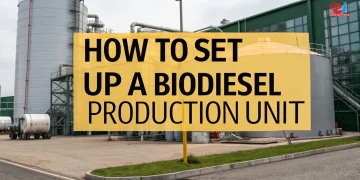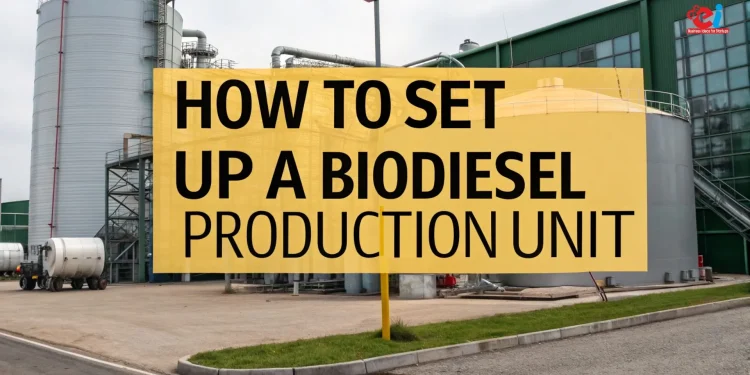Introduction: Biodiesel Manufacturing is a great startup venture
Biodiesel production has become a profitable and sustainable business as the world’s energy landscape moves towards renewable sources. Biodiesel is a viable solution for India’s twin problems of high fuel imports that are high and environmental concerns. It is a cleaner-burning fuel than petroleum diesel. It also reduces greenhouse gases and helps rural economies because it uses locally available raw materials.
Startups and entrepreneurs can take advantage of the growing biodiesel market in India. They will also be at the forefront of India’s clean energy revolution. Setting up a biodiesel factory is a rewarding and realistic venture for startups. Government policies are supportive, there’s a growing demand in the transport and industry sectors, and feedstocks are plentiful.
Understand Biodiesel Before You Start
Transesterification is a chemical procedure that produces biodiesel. Vegetable oils, animal fats, or recycled cooking oil are transformed into fatty acids methyl esters, which can be used as fuel. The process produces glycerin, a by-product with its industrial value.
Biodiesel is compatible with existing diesel engines. It does not require any modifications. This compatibility has a major impact on the market, as it reduces the barriers for end users. It is important to know not only the chemistry, but also the economics and regulations of biodiesel.
Related: How to start a profitable biodiesel manufacturing plant
Step 1: Determine the market demand and feasibility
A clear understanding of the market potential is essential to any successful biodiesel production. The government’s fuel-blending programs, corporate commitments to sustainability, and growing awareness about the benefits of clean fuel are all contributing to the increase in biodiesel consumption in India. The market is expected to grow steadily, with a consumption of 700 million litres per year by 2030.
A feasibility study can help you to identify buyers, understand the competitive dynamics and determine what scale of operation is most profitable. Major consumers include industries such as mining, transport, agriculture, and electricity generation. Export opportunities are also available in countries that want to meet their renewable energy targets.
Step 2: Secure Feedstock
The availability and choice of feedstock has a direct impact on production costs and profitability. In India, non-edible oils such as neem and mahua, which are abundant in rural areas, are very popular. Another option is to collect waste cooking oil from restaurants, hotels and food processors. When there are surpluses of edible oils, they can be used. Algae oil is a promising new source, but it requires specialized cultivation.
By establishing long-term agreements with farmers, collection agencies, or cooperatives, you can reduce the risk of market fluctuations and ensure input cost stability. Many plants that are successful have integrated supply chains where the feedstock is tied to local agricultural activities. This creates mutual economic benefit.
Choose the right location
Location is critical to operational efficiency and controlling costs. An ideal location for your biodiesel unit is close to feedstock sources as well as major markets. The proximity to major transport hubs like highways, railways or ports will reduce your logistics costs. This is especially true if you intend to export. It is important to have access to utilities such as water, electricity and waste disposal systems, along with compliance with environmental and zoning regulations.

Related: Biodiesel Production from Algae
Step 4: Understand the Biodiesel Production Process
It is important for entrepreneurs to know the basic stages of biodiesel manufacturing. Pre-treatment is the first step, in which raw feedstocks are cleaned to remove moisture and impurities. Transesterification is then performed, whereby the oil or fat reacts with methanol and a catalyst to produce biodiesel.
Separation is the next step, in which biodiesel (biodiesel) and glycerin (glycerin are separated based on density. Biodiesel is purified and washed to remove contaminants and soap residues. Glycerin, on the other hand, is refined to be sold to industries like cosmetics and pharmaceuticals. The biodiesel will then be dried to remove all moisture and then stored in tanks. Understanding the process can help you evaluate equipment options, operational workflows, and quality control measures.
Step 5: Layout of Plant and Infrastructure
A well-designed plant ensures a smooth flow of materials from the feedstock to the final product. Layouts typically include storage areas for raw material, pre-treatment, reaction vessels and separation tanks. They also contain quality control laboratories, purification systems and labs for quality assurance.
Automating production where possible can reduce labour costs and minimize human errors. To meet compliance standards, the design should include safety features, fire prevention systems and environmental protection measures. Infrastructure planning should be future-oriented and allow for expansion in the future as demand increases.
Step 6: Meet Regulatory and Quality Standards
In India, biodiesel is required to meet specifications set forth by the Bureau of Indian Standards in order to guarantee the performance and safety of diesel engines. In order to comply, you must also obtain the necessary permissions from your State Pollution Control Board. You will also need to adhere the blending standards set by the Ministry of Petroleum & Natural Gas. The requirements of the Factories Act for workplace safety must be adhered to, and regular inspections ensure compliance.
Biodiesel production cannot be compromised on quality. Biodiesel that is not made properly can cause engine damage, which could lead to legal problems and reputational damage. If you have a robust laboratory in-house or partner with certified testing facilities, every batch will meet the required fuel parameters.
Step 7: Developing a skilled workforce
The success of any biodiesel production plant is not solely dependent on the technology, but also on those who operate it. The need for skilled technicians, engineers, analysts of quality control analysts, and maintenance personnel is essential. The training program should include operational procedures, safety protocols and quality testing. Engaging local technical institutes is an effective way to train and recruit employees.
View our Handbooks on related articles
Step 8: Develop marketing and sales channels
A marketing strategy that is well thought out will ensure a steady demand for your products. It is important to build relationships with fuel distributors and distributors of industrial buyers as well as government agencies that are involved in the blending program. By demonstrating biodiesel’s benefits, such as lower emissions, maintenance costs and compliance with sustainability targets, you can convince customers to switch over from petroleum diesel.
Credibility is important for startups. Certifications, quality assurances and consistent product performance can help achieve this. Exploring niche markets such as providing biodiesel to backup generators for commercial buildings or rural electrification, can create additional revenue streams.
Step 9: Exploring Byproduct Utilization
Glycerin is the primary by-product of biodiesel. It’s a valuable product in and of itself. It can be sold as a refined product to soap, cosmetics and pharmaceutical companies. A biodiesel facility can increase its profitability by developing parallel channels of glycerin sales. This approach is in line with the principles behind the circular economy and turns potential waste into revenue.
Step 10: Prepare for future expansion
Biodiesel is changing, thanks to new feedstocks and improved technologies. Markets are also expanding. Entrepreneurs who start with a plan of scalability will be in a better position to take advantage of future opportunities. It could be designing a modular system that is easily expandable, investing in quality control equipment or diversifying to other biofuels when the market matures.
For more information, check out this video
The role of NIIR Project Consultancy Services
NIIR Project Consultancy Services provides expert assistance to prepare Market Survey cum Detailed Techno-Economic Feasibility Reports, for industrial projects, including biodiesel production units. The reports contain detailed manufacturing processes, as well as raw material requirements, layout plans for plants, and financial projections. NPCS assists entrepreneurs in evaluating the technical and financial viability of new industries. This ensures informed decision-making based upon accurate data and industry insight.
Find Best Idea for Yourself With our Startup Selector Tool
The conclusion of the article is:
The process of setting up a biodiesel production unit involves a combination of technical expertise, strategic planning and market knowledge. Each stage is critical to the success of the venture, from securing reliable supplies and selecting the right location to mastering production and building strong channels.
Now is the time for entrepreneurs who want to get into this industry. The Indian biodiesel sector is poised for rapid growth. Startups can create profitable and sustainable businesses by adhering to quality standards, maintaining compliance with regulatory requirements, and focusing their efforts on operational efficiency. This will contribute to India’s future of clean energy. The production of biodiesel is more than a lucrative business. It is also an investment into a greener and more self-sufficient economy.


















